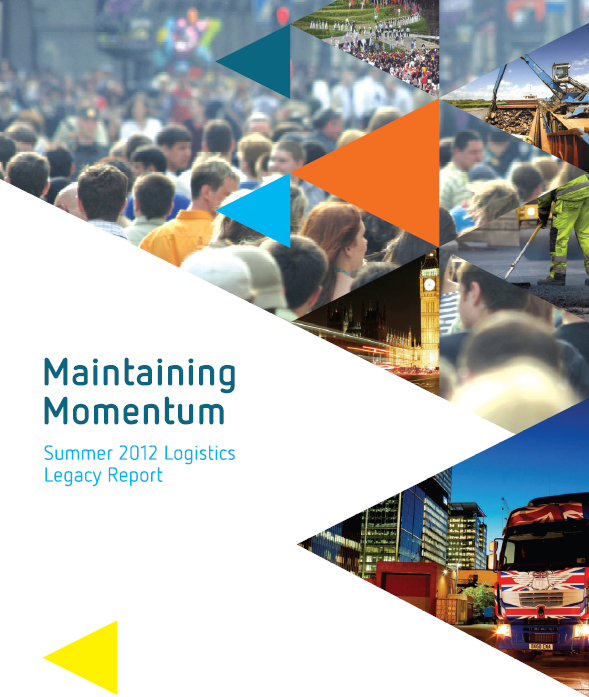NEW REPORT SAYS ‘LONDON 2012 EFFECT’ COULD INCREASE ROAD SAFETY AND BENEFIT ENVIRONMENT
Click on the image below to
read the full report online
 A package of measures put in place by the logistics sector for the London 2012 Olympics and Paralympic Games could, if adopted permanently, improve safety levels for cyclists and other vulnerable users, as well as bring environmental benefits. They include:
A package of measures put in place by the logistics sector for the London 2012 Olympics and Paralympic Games could, if adopted permanently, improve safety levels for cyclists and other vulnerable users, as well as bring environmental benefits. They include:
▪ More night-time deliveries
▪ Consolidation of loads onto fewer vehicles, and;
▪ Much improved levels of communications between local authorities, operators, customers and employees
Those are the findings of a major new in-depth analysis of the performance of the logistics sector during the London 2012 Olympic and Paralympic Games. Maintaining Momentum: Summer 2012 Logistics Legacy Report has established that the planned programme of measures for road deliveries adopted during the London Games last year generated positive outcomes that, if adopted permanently, could improve road safety for cyclists and deliver a ‘hat-trick’ of environmental benefits in London, and anywhere else that adopts them.
These are:
▪ Fewer CO2 emissions
▪ Less traffic congestion
▪ Reduced fuel consumption
The Report highlights Transport for London data showing that the number of lorries over 3.5t in the morning traffic peak (08.30 hrs) during the Games fell almost 15% compared to a summer’s day in 2011. Smarter working achieved an overall reduction in the number of freight vehicles during the Games period, achieved by making more deliveries during the evening and overnight.
Coordinated and innovative approaches meant fewer kerbside deliveries by day, thereby improving the safety of cyclists for whom such vehicles can be an added safety hazard. It also led to a reduction in fuel consumption of between 3% and 6% and reductions in lorry/van driver hours of up to 20%. Fewer goods vehicles on the road by day also indirectly benefitted bus services that were able to move more freely.
With goods vehicles accounting for a sixth of the total distance travelled on London’s roads and over 50% of all cyclist fatalities resulting from collisions with Large Goods Vehicles (LGVs), the “Maintaining Momentum: Summer 2012 Logistics Legacy” Report published today also says that improved communications between local authorities, event managers, logistics operators and customers were a leading feature of the smooth operation of the London Games.
Undertaken by the Chartered Institute of Logistics and Transport (CILT) in association with DHL and University of Westminster, the 52 page Report shows that haulage and supply companies worked hard with transport authorities to put in place measures to manage deliveries beyond the working day. It shows that these methods and behaviours brought positive benefits for all road users, including cyclists, and recommends that the levels of engagement achieved by key stakeholders to achieve these benefits should be maintained in the future.
CILT President, and DHL Supply Chain CEO Europe, Graham Inglis says: “"The lessons learnt by the logistics industry and highlighted in this report, including the beneficial effects of alternative urban solutions and the collaborative effort of the whole industry, have the power to change the future of logistics across the UK.”
Former CEO of CILT, Steve Agg, said: “For freight and passenger transport, the London Games proved a major success. Goods and services were retained at highly efficient levels, and people were able to move London’s streets more quickly and easily. We must now take advantage of this ‘London 2012 effect’ and put some of the lessons learned into practice on a permanent basis for the sake of all road users, especially for cyclists and pedestrians, to make the capital city a more pleasant place to live and work.”
He added: “Freight delivery and logistics operations were made more efficient in London but these methods and approaches could easily be adopted by other cities in the UK, especially those undertaking similar events such as the 2014 Commonwealth Games.”
The report concluded that the success of out-of-hours deliveries during the Games, coupled with the Quiet Delivery Code of Practice established during the run-up period, demonstrated that night-time deliveries can be made efficiently and without inconvenience to residents or businesses whilst achieving reduced fuel consumption, less emissions and safer operations.
In order to exploit these benefits in the future, the report says that regulatory reform of London Lorry Control Scheme is needed, in order to make night deliveries easier. In return operators could be obliged to adhere to a code of conduct specifying low emission grade engines.
The Chartered Institute of Logistics and Transport (CILT), in collaboration with DHL and the University of Westminster, produced Maintaining Momentum: Summer 2012 Logistics Legacy. The 52 page report that details the Games logistics experience can be downloaded below.